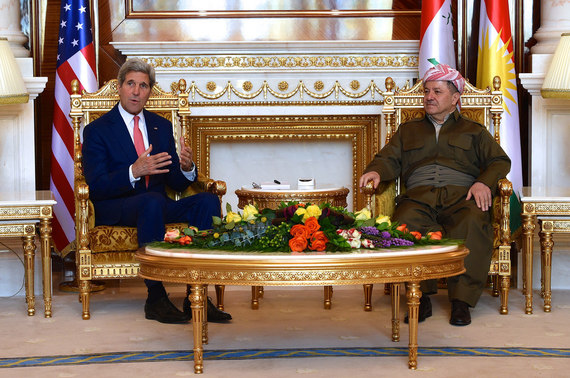Last month, Iraqi Kurdistan President Massoud Barzani gave a very strongly worded interview suggesting his territory will finally break away from Iraq. "It has been proved that the Kurdish people should seize the opportunity now -- the Kurdistan people should now determine their future." And he's now asked the regional parliament to organize a referendum on independence.
A free and independent Kurdistan is almost within reach of its inhabitants, a silver lining that could emerge from the Islamic State of Iraq and Syria's (ISIS) horrific march through much of Iraq. With the Kurds taking the oil-rich city of Kirkuk after the Iraqi Army abandoned it, they are creating, to borrow a phrase, facts on the ground.
If -- and that's a big if -- the Iraqi Kurds take the final step to independence, three interconnected groups should strongly support this: Americans, Israelis, and the Jewish people. Here's why:
Americans: The U.S. government maintains Iraqi Kurdistan should remain part of Iraq. But let's give credit where credit is due: the Kurds are one of the few trustworthy American partners in the region. They fought with us during the 2003 invasion, battled al Qaeda in Iraq and other jihadist groups for years, and now are willing to battle ISIS. Not insignificantly, the Kurds have also carved out a stable political entity without significant U.S. intervention -- unlike the rest of the country.
More broadly, Iraqi Kurdistan is an oasis of pro-American sentiment in a desert of anti-Americanism. Pew's Global Attitudes project from last year indicates Middle Easterners are unhappy with the U.S. -- including allies Jordan, Turkey, and Egypt. For example, almost a majority of Turks -- a NATO ally defended by U.S. missile batteries -- see America as more of "an enemy." This doesn't seem to be the case in Kurdistan, where the American University and other U.S. institutions are welcomed.
Israelis: All the reasons why Americans should embrace an independent Iraqi Kurdistan should apply to Israelis. Unlike America, however, Israel's true partners are few -- but Kurdistan might be one.
Prime Minister Netanyahu might have jumped the gun by endorsing an independent Kurdish state before the Kurds did, but the Israeli-Kurdish relationship has been decades in the making. It began in the 1960s, when Mossad's David Kimche visited Iraqi Kurdistan to talk with Barzani's father in his fight against the military junta. Israel then set up training facilities in northern Iraq to train Kurdish Peshmerga forces. Through the years, there have been whispers (and louder voices) saying the covert relationship blossomed over the last 20 years because of mutual interests. And it might have just gone public: Kurdish-pumped oil might be sitting in Ashkelon right now.
More broadly, the hatred toward Israel that permeates most Middle Eastern societies does not seem to touch Iraq's Kurds. After all, Barzani has said, "Establishing relations between the Kurds and Israel is not a crime." And as the Kurdistan Foreign Relations Department chief told one reporter a few years ago, "[Israel has] not harmed us. We can't be hating them because Arabs hate them." While there are no friends in statecraft, only interests -- it seems what's good for Israel's bottom line is good for Kurdistan as well.
The Jewish people: Is an independent Kurdistan good for the Jews? It's a bit of an abstract question, since most Jews don't know too many Kurds. But Jews should embrace the Kurdish desire for self-rule, because as James Kerchick noted a few years ago, both peoples are "embattled, once-stateless minorities in a region afflicted by obscurantist religious and ethnic movements that seek to sublimate, if not eliminate, religious and ethnic diversity."
Both have also survived multiple efforts to destroy them and thrived in an often-hostile political environment. If Jews subscribe to the notion that a people should have sovereignty in their ancestral homeland, then support should come naturally to the Kurds. If Jews have it, why not the Kurds?
To be sure, an independent Kurdistan will face choppy waters. It will be a landlocked country, surrounded by much larger nations. The Turks remain suspicious of Kurdish independence (although Turkey's ruling party has hinted Ankara's longtime antagonism might be dissipating.) Kurds have fought each other for generations, so the current political comity could falter once the major players -- Barzani and current Iraqi President Jalal Talabani -- leave the scene. Kurdistan also has jihadists in its midst, as well as significant Iranian ties. Plus, Iraq's breakup will lead to unknown political consequences for the region and the world.
But as President Obama said a few years ago, "There must be no doubt that the United States of America welcomes change that advances self-determination and opportunity." He was talking about the tumultuous change occurring in the wake of the Arab Spring, but his words have more meaning in a place like Iraqi Kurdistan where an oppressed people are finally moving toward self-rule.
The long-delayed train to Kurdish independence might be already leaving the station, and America, Israel, and the Jews can either get on or remain on the platform. We should support the Kurdish people in their long ride to freedom.
